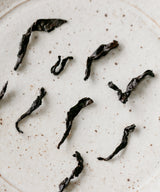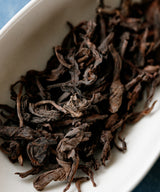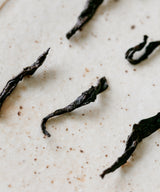Xigui 2019
昔归古树熟普洱2019
Harvest
April 2019
Origin
Xigui Village, Lincang Prefecture, Yunnan
This Pu’erh comes from the remote and historic mountain village, Xigui, of Lincang Prefecture. When I visited this village, at the foothill of Daxueshan 大雪山 (Big Snow Mountain), I drove for many hours, winding upwards between the peaks of this dense mountain range. The blue sky reflected in the water of the Lancang River below and, as I gained elevation, I could catch its shimmer coming through the banana and bamboo trees that lined the muddy roads. It occured to me that the mud of these narrow, tired roads was the same dark yellow colour it would have been one thousand years ago, when it was Tea Horse Road – the route used to transport tea to Tibet, Mongolia, and the emperor. Arriving in the village of Xigui, at 3200 ft above sea level, is like having unfolded the mountains to discover a secret they’ve been conspiring with the clouds to keep.
Our Xigui comes from the family of Zhang Tianwen, who have been inhabitants of these mountains for generations. The tea trees, at roughly 200 years old, grow on steep hills overlooking the valley and rivers beneath them. These trees are not very tall, nor do they appear very strong: I found them surprisingly delicate looking, with mottled bark, and almost frail seeming branches. Their age is expressed in the moss and the fungi inhabiting their trunks, and their vitality, however discrete, is evident in the width of their branches and the abundance of their dark, shiny green leaves.
The name of the village, Xigui 昔归, is worth noting for how poetic it is. The first character, xi (昔) loosely translates to former times, or ‘the past’. The second character, gui (归), loosely translates to go back to, belong to, return to. The movement in this name is backwards, and also, in-to. It evokes familiar and stabilizing sensations: of belonging, and of the endurance we experience in our childhood and adolescence.
What makes this pu’erh ripe so special is that the leaves are harvested from 200 year old trees. In Yunnan, the leaves of ancient arbor trees are almost exclusively used to make pu’erh raw, as they fetch a much higher price. It is very unusual practice to craft a ripe tea from them. The artisan, Zhang Tianwen’s, intention was to make a pu’erh ripe using leaves from arbor trees, crafted and fermented with traditional techniques, precisely because such a tea did not exist in the market.
This pu’erh was fermented for 6 months in small batches, and then aged for 9 months. The result of Zhang’s experiment is something very rich and satisfying. The ruby red liquor has a mouthfeel so rich it weighs on the tongue like broth. It is deep and silky, carrying a unique taste not commonly found in pu’erh ripes – one we must attribute to the fermenting of the leaves of 200 year old trees.
We would want this pu’erh in wet or dark weather, for its nourishing sensation, and warm, enveloping qualities.
. . .
Brewing guide
The key to brewing this tea is to use boiling water, and very fast infusions, starting at 10 seconds.
| Tea | 4 g |
| Temperature |
100°C |
| Water | 120 ml |
| Steep time | 10 - 60 sec |
| No. of infusions | 10 |










